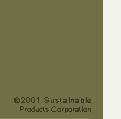|
|
|
 |
 |
|
|
|
|
|
|
|
|
|
 |
|
|
|
|
|
|
|
|
|
|
|
|
|
|
|
|
|
|
|
|
|
|
|
|
 |
|
An Organic Solution to a Political and Environmental Mess, or "Have Your Corn and Drive it Too" Please feel free to submit newsworthy information relating to sustainable products. Inquiries will be considered and responded to promptly. |
- INFO/ FAQ's
- Why are sustainable products more profitable than conventional products?
- As concluded in SPC's peer reviewed Training Manual, the public prefers sustainable products and will pay somewhat more for them than conventional products, they have cheaper raw materials, less liability, fewer regulatory constraints, and faster product time to market. Sustainable products have more value than conventional products.
- Are there tools available that identify sustainable products?
- Sustainable products defined and tools to identify them are located at: Sustainable Products Defined and Identified.
- Why are entities that know sustainable product issues more competitive?
- As documented in SPC's Training Manual, the strong demand for sustainable products exceeds their supply and stems from (1) a comprehensive base of environmental law and regulation governing product development, (2) public preference for them as long as they work as well as conventional products, (3) compelling global health and environmental concerns over climate change, acid rain, stratospheric ozone depletion, ocean pollution, and chronic health hazards such as cancer and genetic defects from chemicals in products, (4) comprehensive U.S. and international requirements specifying life cycle assessment (LCA) as the proper method for identifying sustainable products (LCA looks at environmental and health impacts from raw materials extraction, through manufacturing, to product reuse or disposal), & (5) the recent emergence of LCA as a cost-effective and understandable evaluation tool.
- Who needs to know about sustainable products?
- Professionals dealing with purchasing, marketing, specifying, designing, manufacturing, or communicating about products.
- What products do "sustainable products" cover?
- All products made because they are now being evaluated to determine what burden they place upon global health, welfare, and environment. Those that are sustainable have the least or no health or environmental degradation on humans and our planet, and promote social welfare.
- What are benchmarks or good examples of sustainable products?
- As concluded by SPC's Training Manual, sustainable products include wood certified as managed pursuant to Forest Stewardship Council principles (www.fscus.org), Patagonia's organic cotton clothing (www.ota.com), and DesignTex fabric, (www.dtex.com).